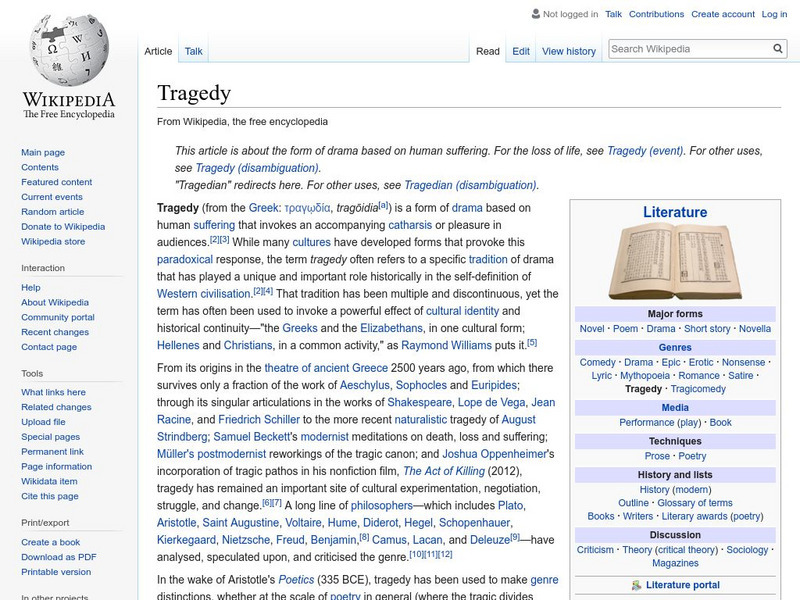Hi, what do you want to do?
Curated OER
Orfeo: Sinfonie e Ritornelli
Students identify the dramatic expression made by performance and how it relates to the content of the story L'Orfeo. They determine the form of orchestra and each instrumental group within the orchestra for this piece.
Curated OER
Stuff Gods Are Made Of
Young scholars examine different myths of various cultures around the world. Using artwork, they discuss the artistic designs and develop hypothesize about their importance. They use the internet to research myths they are aware of and...
J. Paul Getty Trust
J. Paul Getty Museum: Art of the Ancient Greek Theater
Explore an exhibition of art (sculptures and painted vases) that takes Greek drama as its subject shows the many different ways that Greek visual artists interpreted the dramatic arts in their work. Find a click-through slideshow of art...
TES Global
Tes: Genre: Ancient Greek Theatre: Comedy and Tragedy in Ancient Greece
[Free Registration/Login Required] This is a slide show with images and information about Ancient Greek Theatre including the masks used for comedies and tragedies.
Read Works
Read Works: Ancient Greece Greek Drama
[Free Registration/Login Required] An informational text about the birth of theater in ancient Greece. A question sheet is available to help students build skills in reading comprehension.
Stephen Byrne
History for Kids: Ancient Greek Theatre
Overview of the history of ancient Greek theatre written in a kid-friendly format teaches about the architecutre of the theatre buildings as well as the structure of the plays.
TheatreHistory.com
Theatre history.com: Sophocles and His Tragedies
This site provides a complete biography of Sophocles reprinted from a drama history book. Includes his innovations in ancient theater and his achievements as an artist.
Other
Ancient Greek Theatre: The Actors and the Chorus
General information on Greek actors, costumes, masks, scenic appearances, and the chorus.
Other
Ancient Greek Theatre: Sophocles
A personal site on Greek theatre with a brief biography of Sophocles, along with a short list of his works and summaries of each.
Massachusetts Institute of Technology
Mit: Internet Classics Archive: Medea (Euripides)
MIT offers an online version of the classical play "Medea" by the Greek playwright Euripides.
Georgia Department of Education
Ga Virtual Learning: "Elements of Drama" [Pdf]
This two-page PDF provides a list and brief explanation of the "Elements of Drama" based on the structure of Greek Drama as outlined by Aristotle. These include: Thought, Theme, Ideas; Action, Plot; Characters, Language, Music, and...
University of Adelaide
University of Adelaide: The Phoenissae by Euripides
The ancient Greek tragedy, The Phonessae, or The Phoenician Women, is offered here in a clearly formatted, full text version at this site.
University of Adelaide
University of Adelaide: The Suppliants by Euripides
Read the whole text of this ancient Greek tragedy at this well-laid-out site from the University of Adelaide.
University of Adelaide
University of Adelaide: Medea by Euripides
The ancient Greek playwright's famous story of the jealous Medea is presented here in full text.
Steven Kreis, PhD
The History Guide: Classical Greece, 500 323 b.c.
Read about the Persian invasion of Greece, the Age of Pericles, the Peloponnesian War, and the culture of Classical Greece.
National Endowment for the Humanities
Neh: Edsit Ement: Live From Antiquity!
Intended to accompany a reading of Sophocles' _Antigone_, "Live From Antiquity!" provides framework for teaching the "cultural and historical context of Greek drama and its role in Greek society."
Massachusetts Institute of Technology
Mit: Internet Classics Archive: Agamemnon, by Aeschylus
Aeschylus' famous play, Agamemnon, was written in 458 BCE. The full text available here provides an important perspective on the figure of Agmamemnon in ancient Greek culture.
University of Adelaide
University of Adelaide: Hippolytus by Euripides
The text of Euripides' ancient play, Hippolytus, is offered at this clearly formatted site.
Wikimedia
Wikipedia: Tragedy
This encyclopedia entry from Wikipedia about tragedies discusses its Greek origins; the typical characteristics of a tragedy; and lists some examples of ancient Greek, Roman, English, and modern-day writers of tragedies.
TED Talks
Ted: Ted Ed: Why Is Aristophanes Called the Father of Comedy?
Aristophanes, often referred to as the Father of Comedy, wrote the world's earliest surviving comic dramas. Mark Robinson shares a brief history of Aristophanes.
Other
Theatre and Drama in Ancient Greece
Brief description of how societal traditions developed into theater in Ancient Greece. Includes well-known playwrights and plays as well as links to comprehensive information within and outside of the site.
Able Media
Ctc: Gods, Grief and Freedom in Aeschylus' Oresteia
Refers to the underlying theme of Greek tragedies as mere mortals worrying about their actions.
Blackdog Media
Classic Reader: The Clouds by Aristophanes
This is the full text of the play The Clouds by Aristophanes including a list of characters and the setting.
Massachusetts Institute of Technology
Mit: Internet Classics Archive: Heracles by Euripides
MIT's Internet Classics Archive offers a complete text of the famous tragedy by Euripides.















![Ga Virtual Learning: "Elements of Drama" [Pdf] Unit Plan Ga Virtual Learning: "Elements of Drama" [Pdf] Unit Plan](https://static.lp.lexp.cloud/images/attachment_defaults/resource/large/FPO-knovation.png)











